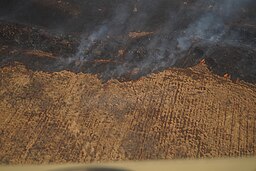The Dan River near Eden, N.C., has been transformed into a bubbling caldron of black muck.
Unfortunately for North Carolinians, this is not a fairy tale; it is a dangerous by product of our nation’s dependence on coal.
According to CBS News, on Monday, Feb. 3, Duke Energy released an initial statement admitting that 50,000–82,000 tons of coal ash and up to 27 million gallons of tainted water were released from a storage pond in Eden into the Dan River, making it the third largest coal ash spill in U.S. history.
The cause of this incident?
According to the Charlotte Observer, Duke Energy attributed the leakage to a broken 48-inch storm drain that ran under an unlined storage pond for the Dan River Combined Cycle Station. The contents of the pond flowed into the pipe, eventually draining directly into the Dan River.
“I just think it’s really sad for the residents who have lived and grown up around that river,” said Saidivya Komma, treasurer of the Early College Environmental Club. “It’s been healthy for about 53 years. Now, it’s suddenly contaminated, and when summertime comes this year, they probably won’t be able to enjoy it like they used to.”
This is not the first time Duke Energy has failed to meet state regulations on coal ash storage and handling.
“You may be aware that the state of North Carolina had brought suit against Duke Energy in actions taken last year,” said Susan Massengale, representative of the N.C. Department of Environment and Natural Resources, in an email interview.
This lawsuit, currently making its way through the legal process, was filed in an attempt to remedy a variety of contamination issues with Duke Energy facilities including the Dan River disposal site.
For residents who depend on the Dan River for drinking water, news of the coal ash spill could have had more severe implications.
“In the short term, we have been fortunate that the closest drinking water system (in) Danville, Va., and all those further down river have been able to filter the water to meet Environmental Protection Agency drinking water standards,” said Massengale.
Unfortunately, the long-term health of the Dan and other waterways damaged by the coal industry is not as clear.
“The story of the long-term impact of the spill and the recovery of the Dan River will be told by the sediment and the heavy metals in the coal ash that has settled on the river bed and along the banks,” said Massengale.
Substances such as coal ash and MCHM, byproducts of coal production and usage, are often tested for their effects within the parameters of their intended usage. However, additional information about environmental interactions can be scarce.
“It comes down to economics … the chemicals that (Duke Energy) was using were safe for what they were being used for,” said Bonnie Ware, hydrogeologist for the N.C. DENR. “It is economically infeasible to test the chemicals for every scenario other than what they’re actually going to be used for.”
Coal ash spills are not the only risk associated with the coal industry. According to CNN, a recent chemical spill in West Virginia’s Elk River left over 300,000 residents without access to potable water.
The primary constituent of the spill, MCHM, has yet to be heavily tested for potential environmental impacts.
“River ecosystems are very complicated,” said Komma. “The smallest living things, such as macrovertebrates, can affect the entire food web. The river’s health is basically determined by those species, and if they can’t recover, then I doubt the Dan River will.”












